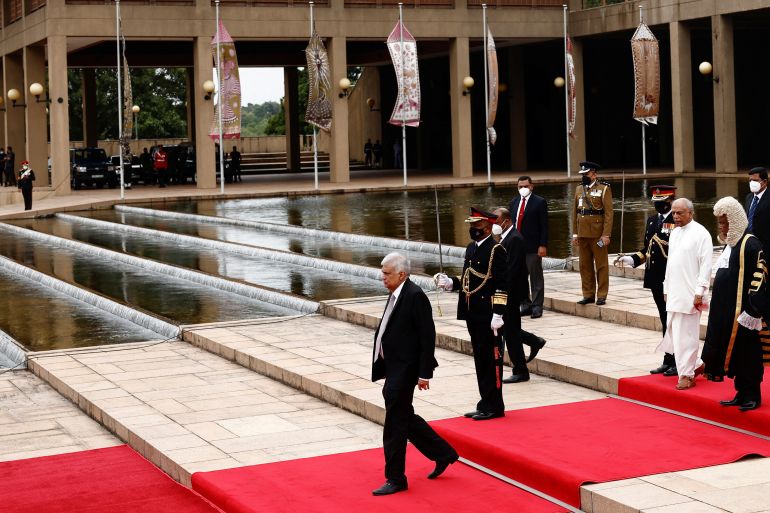Sri Lanka facing ‘great danger’, IMF talks to restart: President
Ranil Wickremesinghe makes the remarks during his speech to open a new session of the parliament in the crisis-hit nation.

Sri Lanka will restart bailout talks with the International Monetary Fund (IMF) in August, its new president says, calling on the legislators to form an all-party government to resolve the country’s worst economic crisis in 70 years.
President Ranil Wickremesinghe made the remarks during his speech to open a new session of the parliament on Wednesday.
Keep reading
list of 4 items‘How can we cope?’ ask Sri Lankans as gov’t limits fuel imports
Rights group seeks arrest of ex-Sri Lanka president in Singapore
Photos: Soup kitchens in crisis-hit Sri Lanka feeding the poor
Wickremesinghe has been leading talks with the IMF to secure a four-year bailout programme that could provide up to $3bn. He told parliament the negotiations were progressing but did not provide a timeline for when a deal would be finalised.
The 73-year-old, who was propelled to power last month after his predecessor Gotabaya Rajapaksa was forced to flee the country and resign after months of protests, said the financial meltdown had turned into a serious political crisis.
“Today we are facing an unprecedented situation that our country had never faced in recent history,” he said. “We are in great danger.”
Wickremesinghe said constitutional amendments were required to curtail presidential powers – indicating he would meet a key demand of protesters who forced out Rajapaksa.
“The president of a country does not have to be a king or a god who is exalted above the people. He or she is one of the citizens,” he said.
The president said the only way to escape the crisis was “if we all face this challenge together as one people,” and asked all parties in parliament to join his initiative for a “unity government”.
He added that his government is preparing a national policy roadmap for the next 25 years that aims to cut public debt and turn the country into a competitive export economy.
“If we build the country, the nation and the economy through the national economic policy, we would be able to become a fully developed country by the year 2048, when we celebrate the 100th anniversary of independence,” Wickremesinghe said.
The island nation of 22 million people is facing its worst financial crisis since independence from Britain in 1948 with its foreign exchange reserves at record lows, and the economy battered by the COVID-19 pandemic and a steep fall in government revenue.
Angered by persistent shortages of essentials, including fuel and medicines, and sky-rocketing inflation of more than 60 percent year on year, hundreds of thousands of people took to the streets in early July, forcing Rajapaksa to first flee the country and then quit office.
Protesters blamed the Rajapaksas for years of mismanagement and corruption that bankrupted the nation and led to unprecedented shortages of essential imports such as fuel, medicine and cooking gas.
But many are still sceptical of Wickremesinghe and accuse him of trying to protect the former leader and his relatives.
His government cracked down on protests and many leaders of demonstrations have been arrested on charges of trespassing and damaging public property. Protest camps set up in front of the president’s office were dismantled by armed soldiers who beat up protesters.
However, Wickremesinghe on Wednesday denied that he was “hunting down” protesters. He said he will protect peaceful protesters and open an office to handle complaints of any wrongful action.